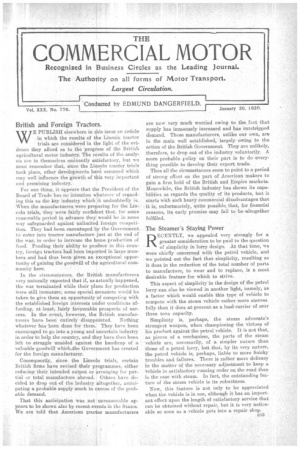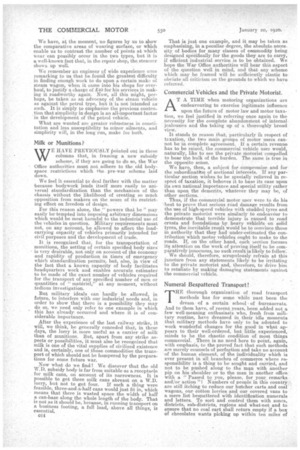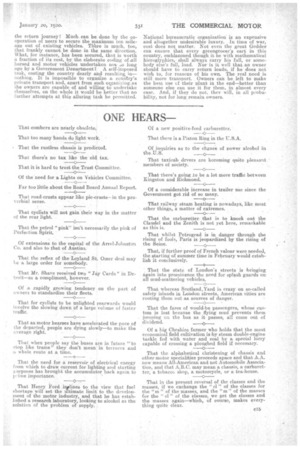British and Foreign Tractors. •
Page 1

Page 2

Page 3

If you've noticed an error in this article please click here to report it so we can fix it.
WE PUBLISH elsewhere in this issue an article in which the results of the Lincoln tractor trials are considered in the light of the evidence they afford as to the progress of the British agricultural motor industry. The results of the analy sis are in themselves eminently satisfactory, but we must remember that, since the Lincoln tractor trials took place, other developments have occurred which may well influence the growth of this very important and promising industry.
For one thing, it appears that the President of the Board of Trade has no intention whatever of regarding this as the key industry which it undoubtedly is. When the manufacturers were preparing for the I4n. coin trials, they were fairly confident that, for some reasonable period in advance they would be in some way safeguarded against unlimited foreign competition. They had been encouraged by the Government _ to enter into tractor manufacture just at the end of the war, in order to increase the home production of food. . Pending their ability to produce in this country, foreign tractors had been imported in large numbers and had thus been given an exceptional opportunity of gaining the goodwill of the agricultural community here.
In the circumstances, the British manufacturers very naturally expected that if, as actually happened, the war terminated while their plans for production were still immature, some special measures would be taken to give them at opportunity of competing with the established 'foreign interests under conditions affording, at least, fairly favourable prospects of success. In the event, however, the British manufac turers hava been entirely disappointed. Nothing whatever has been done for -them. They have been encouraged to go into a young and uncertain industry in order to help the country, and they have then been left to struggle unaided against the handicap of a valuable goodwill which..the Government has created for the foreign manufacturer.
Consequently, since the Lincoln trials, certain British fines have revised their programmes, either reducing their intended output or arranging for partial or total manufacture abroad. Others have decided to drop out of the industry altogether, anticipating a probable supply much in excess of the probable demand.
That this anticipation Was not -unreasonable appears to be shown also by recent events in the States. We are told that American tractor manufacturers are now very much worried owing to the fact that supply has immensely increased and has outstripped demand. These manufacturers, unlike our own, are in the main well established," largely owing to the action of the British Government. They are unlikely, therefore, to drop out of the industry voluntarily. A more probable policy on their part is to do everything possible to develop their export trade.
Thus all the circumstances seem to point to a period of strong effort on the part of American makers to gain a, firm hold of the British and Empire markets. Meanwhile, the British industry has shown its capabilities as regards the quality of its products, but it starts with such heavy commercial disadvantages that -it is, unfortunately, quite possible_ that, for financial reasons, its early promise-may fail to be -altogether fulfilled.
The Steamer's Staying Power ECENTLY, we appealed very strongly for a greater consideration to be paid to the question of simplicity in lorry design. At that time, we were chiefly concerned with the petrol vehicle, and we pointed out the fact that simplicity, resulting as it does in the reduction of the total number of parts to manufacture, to wear and to replace, is a most desirable feature. for which to strive.
This aspect of simplicity-in the design of the petrol lorry .can also be viewed in another light, namely, as a factor which would enable this type of vehicle to compete with the steam vehicle rather more success fully-than it does at present as a load-carrier of over three tons capacity.
Simplicity is, perhaps, the steam advocate's strongest weapon, when championing the virtues of his product against the petrol vehicle. It is not that, as pieces of a mechanism, the parts of the steam vehicle are, necessarily, of a simpler nature than those of a petrol lorry, but that, by its very nature, the petrol vehicle is, perhaps, liable to more finicky troubles and failures.. There is rather more delicacy in the matter of the necessary adjustment to keep a • vehicle in satisfactory running order on the road than is the ease with steam. In fact, the outstanding feature of the steam vehicle is its robustness.
Now, this feature is not only to be appreciated when the vehicle is in use, although it has an important effect upon the length of satisfactory service that can be obtained without repair, but it is very noticeable so soon as a vehicle gets into a repair shop. We have, at the moment, no figures by us to .show the comparative areas of wearing surface, or which enable us to contrast the number of points at which wear can possibly occur in the two types, but it ia a well-known fact that, in the repair shop, the steamer shows up well.
We remember an engineer of wide experience once remarking to us that he found the greatest difficulty in finding enough work to do upon a certain make of steam wagon when it came into his shops for overhaul, to justify a charge of .240 for his services in making it roadworthy again. Now, all this might, perhaps, be taken as an advocacy of the steam vehicle as against the petrol type, but it is not intended as such. It is simply to emphasize the previous contention that simplicity in design is an all-important factor in the development of the petrol vehicle.
What are wanted are greater robustness in constitution and less susceptibility to minor ailments, and simplicity will, in the long run, make for both.
Milk or Munitions ?
WE HAVE PREVIOUSLY Pointed out in these columns that, in framing a. new subsidy scheme, if they are going to do so, the War Office authorities must not adhere to the old bodyspace restrictions which the pre-war scheme laid down.
We feel it essential to deal further with the matter
because bodywork lends itself more easily to universal standardization than the mechanism of the chassis without the likelihood of creating NO much opposition from makers on the score of its restricting effect on freedom of design.
For this reason alone, the "powers that be" may easily be tempted into imposing arbitrary dimensions which would be most harmful to the industrial use pf the vehicles in question. Military requirements must not, on any account, be allowed to affect the loadcarrying capacity of vehicles primarily intended for civil purposes and the development of trade.
It is recognized that, far the transportation of munitions, the setting of certain specified body sizes ' is very desirable, not only on account of the economy and rapidity of production in times of emergency which standardization permits, but, also, in view of the fact that a known capacity of body 'facilitates headquarters work and enables accurate estimates to be made of the exact number of vehicles required for the transport of any specified number of men or quantities of "materiel," at any moment, without tedious investigation.
But military ideals can hardly be allowed, in future, to interfere with our industrial needs and, in order to show that there is a possibility they may do so, we need only refer to one example in which this has already occurred and where it is of con siderable importance.
After the experience of the last railway strike, it will, we think, be generally conceded that, in these days, the lorry is, more useful as a carrier of milk than of munitions. But, apart from any strike aspects or possibilities, it must also be recognized that milk is one of the vital supplies of civilized existence and is, certainly, one of _those commodities the transport of which should not be hampered by the preparations for some future war. . Now what do we find? We discover that the old W.D. subsidy body is far from suitable as a receptacle for milk cans, on account of its narrowness. It is possible to get three milk cans abreast on a W.D. lorry, but not to get four. If such a thing were feasible, three-and-a-half cans would just fit in, which means that there is wasted space the width of half a can-base along the whole length of the body. That is not as it should be, because, in running tiansport on a business footing, a full load, above all things, is essential.
014
That is just one example, and it may be taken as emphasizing, in a peculiar degree, the absolute necessity of bodies for many classes of commodity being designed specifically for the goods they are to carry, if efficient industrial service is to be obtained. We hope the War Office authorities will bear this aspect of the question well in mind, and that any scheme Nv ii i c h may be framed will be sufficiently elastic to obviate all criticism on the grounds to which we have
referred.
Commercial Vehides and the Private Motorist.
AT A TIME when motoring organizations are endeavouring to exercise legitimate influence upon the future of motor law and motor taxation, we feel justified in referring once again to the necessity for the complete abandonment of internal jealousies and the taking up of a thoroughly broad view.
It stands to reason that, particularly in respect of taxation, the two main groups of motor users cannot be in complete agreement. If a certain revenue has to be raised, the commercial vehicle user would, naturally, like to see the private motorist compelled to bear the bulk of the burden. The same is true in the opposite sense.
We have, then, a subject for compromise and for the subordination of sectional interests. If any particular section wishes to be specially relieved in respect of taxation, it behoves it to base its case upon its own national importance and special utility rather than upon the demerits,whatever they may be, cif other sections.
Thus, if the commercial motor user were to do his ".best to prove that serious rOad damage results from the use of high-speed vehicles with studded tyres and the private motorist were similarly to endeavour to demonstrate that terrible injury is caused to road crusts and foundations by heavy vehicles on solid tyres the inevitable result would be to convince those in authority that they had under-estimated the contribution which motor vehicles ought to make to the roads. If, on the ether hand, each section focuses its attention on the work of proving itself to be comparatively innocuous, no such result is likely to follow.:
We should, therefore, scrupulously refrain at this juncture from any statements likely to be irritating to the private motorist and, therefore, to drive him to retaliate by making damaging statements against the commercial vehicle.
Numeral Bespattered Transport!
HE thorough organization of road transport methods has for some while past been the dream of a certain school of bureaucrats. And to them have, of recent years, been added not a few well-meaning enthusiasts who, fresh from military routine, have dreamed in their idle moments that military methods have only to he adopted to work wonderful changes for the good in what appears to their well-ordered, but little experienced, minds to be the chaotic condition of most things commercial. There is no need here to point, again, with emphasis, to the proved fact that such methods are merely counsels of perfection and take no account of the human element, of the individuality which is ever present in all branches of commerce where responsibility is a thing to be sought and carried, and not to be pushed along to the man with another pip on his shoulder or to the man in another office with a "Passed to you please, for your, remarks and/or action" I Numbers of people in this country are still itching to reduce our butcher carts and coal wagons, our cotton lorries and our covered vans to a mere list bespattered with identification numerals and letters. To sort and control them with zones, districts, sub-districts, regions and what-not and to ensure that no coal cart shall return empty if a box of chocolates wants picking up within ten miles of the return journey t /filchcan be done by the cooperation of users to secure the maximum ton mileage out of existing vehicles. Tliere is much, too, that frankly cannot be done in the same direction. What, for instance, has been secure& that is worth a fraction of its cost, by the elaborate coding of ;all horsed and motor vehicles undertaken nou so long ago by a Government Department.? A self-iinposed task, costing the country dearly and resulting in— nothing. It is impossible to organize a country's private transport and, apart from such orgainzing.-as the owners are capable of and willing to undertake themselves, on the whole it would-be better that no further attempts at this alluring task be permitted. 'National bureaucratic organization is an expensive and altogether undesirable luxury. In time of war, cost does not matter. Not even the great Geddes can ensure that every greengrocer 's cart in this country, emblazoned though it be with mathematical hieroglyphics, • shall always carry his full, Or somebody else's full, load. Nor is it well that an owner .should have to carry return loads, if he does not wish to, for reasons of his own. The real need is still more transport. . Owners can be left to make the best use of their plant in the end—better than someone else can use it for them, in almost every case. And, if they do not, they will, in all probability, not for long remain owners.




























